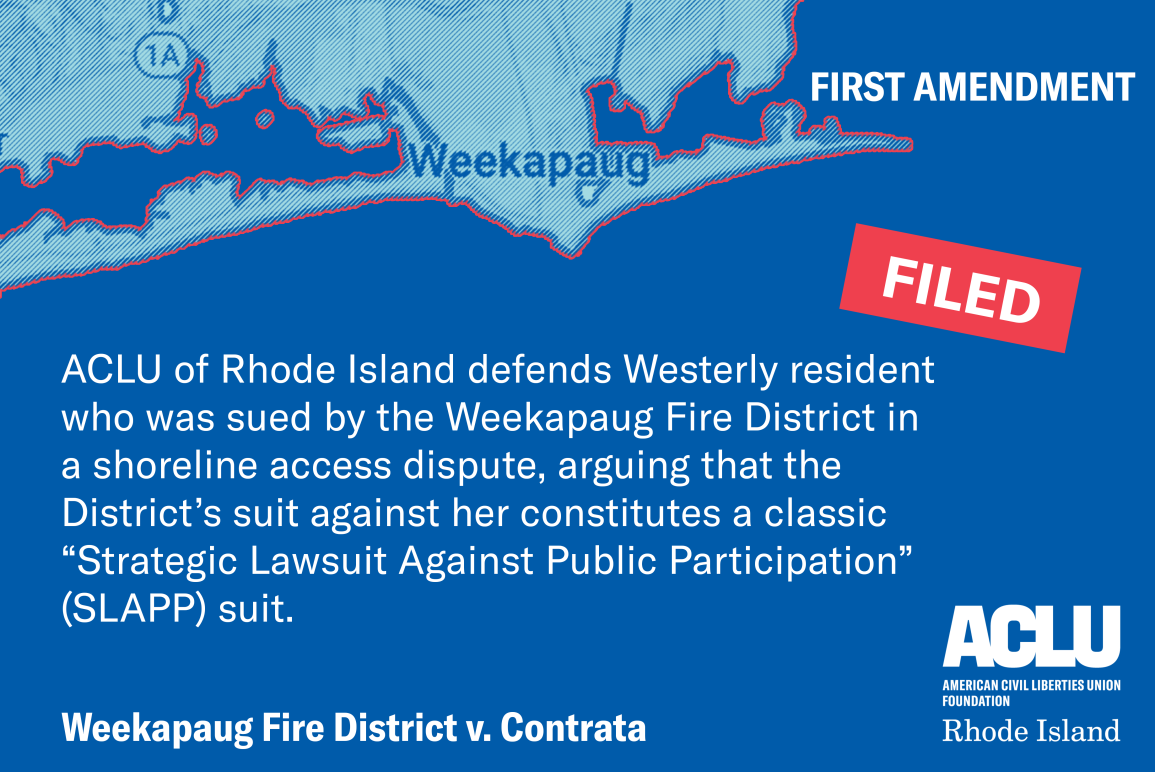The continuing fight between the Weekapaug "Fire" District and the public over beach access
By the ACLU RI
EDITOR'S NOTE: Weekapaug Fire District is one of several along the coastline (two in Charlestown) that have no fire-fighting capability. Instead, they function as high-end Homeowner Associations that manage more than 400 acres of beach property, usually paying little or no taxes. Their tax-exempt and under-taxed properties drain millions of dollars from Charlestown and other coastal towns' tax base. This issue has been studied in detail by Alex Nunes at the Publics Radio (click here for an article with excellent background on Weekapaug and other fake fire districts) as well as here in Progressive Charlestown (click here for an overview of their impact on taxes). - Will Collette
In response to the suit filed against Contrata, ACLU
of Rhode Island cooperating attorney Michael Rubin today filed a
motion to have her dismissed from the case, arguing that the District’s suit
against her constitutes a classic SLAPP suit.
SLAPP (“Strategic Lawsuits Against Public Participation”)
refers to lawsuits brought to chill people from exercising their freedom of
speech on matters of public concern.
The state’s anti-SLAPP statute establishes a process for
defendants in such lawsuits to quickly move to have the suit dismissed if it is
based on a good faith exercise of their right to free speech.
In December, the Fire District filed this suit in Superior Court against more than 20 defendants, including the Attorney General and the Town of Westerly, for seeking a determination from the Coastal Resources Management Council that a strip of land along the beach at Weekapaug is not purely private. Contrata, who moved to intervene in the proceedings before the CRMC, is the only private individual being sued in the case.
Calling the Fire District’s actions “an attempt to use a
part of the sovereign power of the State to sue a citizen for speech,” ACLU
cooperating attorney Rubin argued in his brief that:
The Complaint is rife with charges of “public pressure” and “political” behavior. Likewise, the Complaint refers to Town leaders acting “to appease their constituents.”
But perspective matters. That which one person
perceives as public pressure another person might perceive as civic engagement.
What one describes as political conduct another might describe as participation
in civil society. What one sees as appeasement another will see as the proper
workings of representative government.
In short, whatever connotations and characterizations WFD
might employ, the fact remains that WFD targets the act of petitioning
government for redress of grievances. That, WFD—a municipal corporation—cannot
Constitutionally do.
This is the third time in recent months the ACLU has found itself challenging the Fire District’s activities. Last September, the ACLU successfully objected when it learned that people had to provide an email address or sign in via a Google or Facebook account in order to gain access to the District’s website.
Then in December, the Affiliate blasted the District when it sent out threatening notices to individuals solely for making donations to help fund the litigation with the CRMC in this case.
The Fire District’s
letter warned the donors that they were a “potential witness” in the case and
that they might be “called to testify, by subpoena or otherwise, in this matter
at any time.” In an eerie forerunner to today’s action, the ACLU argued to Fire
District officials at the time:
It is hard to imagine a more quintessentially protected
activity—protected as freedom of speech (expressing support for a position on a
matter of public concern), freedom of association (joining with other
like-minded individuals to advocate for a cause), and freedom to petition the
government (support for a position pending before a government agency)—than the
core action of donating in response to a request for support to advance one
side of an ongoing public government proceeding.
The motion filed today asks the court to dismiss the case
against Contrata and to award her attorneys’ fees under the SLAPP suit statute.
Contrata said:
“Becoming involved in re-opening the Spring Avenue right-of-way to the public is the first time I have been involved in public discourse in a meaningful way. I just love the beach; this is why I live in Westerly. I naturally volunteered to bring the matter to the full attention of the CRMC. Things took a turn for the worse when my public engagement became the object of the Weekapaug Fire District lawsuit. I am humbled by, and grateful to, the many people who have helped with their expertise and provided emotional support during this ordeal.”
ACLU cooperating attorney Rubin added: “This lawsuit is an attempt by a local government—the Weekapaug Fire District—to seek an award of money against an individual middle-class Rhode Islander—Caroline Contrata.
The District is suing her for her stance in a dispute over whether a local road is public. The District is a municipality with the power to tax. Thankfully, Caroline Contrata has the ACLU to help fight back.
